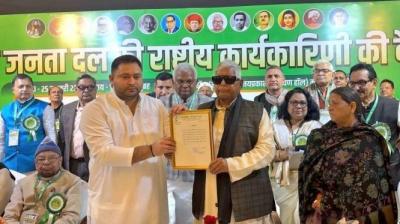
Chandigarh: Punjabi novelist, play writer and famous Theatre personality Ajmer Aulakh is no more. He passed away early in the morning today at his residence in Mansa. He was 75 years old. Aulakh dedicated his life to people gripped in the jaws of socioeconomic crises.
Chandigarh: Punjabi novelist, play writer and famous Theatre personality Ajmer Aulakh is no more. He passed away early in the morning today at his residence in Mansa. He was 75 years old. Aulakh dedicated his life to people gripped in the jaws of socioeconomic crises.
The son of a landless peasant, Aulakh grew up watching his parents work hard in the fields of others. He bore all the problems in his life that a common man has to bear. Aulakh was a Punjabi playwright and 2006 Sahitya Akadmi Award winner, the highest award in the state.
Working for the peasant class through his own medium of the theater, Aulakh dedicated three decades of his life to the depiction of the suffering of common men and peasants at the hands of socioeconomic crises and the rural community through his plays. Aulakh had written more than 12 plays in Punjabi, which portray the conditions of the rural peasantry and the rural community.
Aulkh was a lecturer by profession. At a tender age, when Aulakh was studying in fourth class, he took his pen and wrote a wonderful poem related to the peasant class. He was inspired to craft the real experience of a peasant because his parents worked in the fields of others for which they often felt humiliated. One of his plays, "Bhath Kherian da Rehna" ("Living in a Furnace") was marvelous work that depicted the life of a character named Nirmal, who is the son of a poor peasant.
Lacking financial resources, Nirmal's dream of taking higher education at college were dashed and the he was forced to join the police as a constable. Aulakh dedicated his whole life to the theater. A media person had asked him that he could have gone to cinema then why he chose to remain in theater? Aulakh replied, “I want to work for my people. I want to be in touch with villages and its people. It's a direct medium through which I am connected with my audience. I feel satisfaction while working in theater."














